| Srl | Item |
| 1 |
ID:
143270
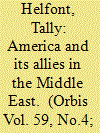

|
|
|
|
|
| Summary/Abstract |
Much has been said about a perceived steady decline of U.S. influence in the Middle East, and American weakness in the world more generally. Though there is some truth to the assertion that the United States’ ability to project power and assert influence in the Middle East has waned since it first sent occupying forces to the region in response to the attacks of 9/11, this does not necessarily equate to a black-and-white dichotomy of former might and current powerlessness. America's activities in Iraq in particular have led to some second and third order consequences that it will be dealing with for some time. While the empowerment of Iran is likely the most dominant negative consequence to emerge from America's activist foray into the region, the galvanizing of a strong pro-Western geopolitical alliance bloc poised to confront Iran and other subversive actors in the region is surely its most positive consequence. As this article will demonstrate, the ability of the United States to capitalize on opportunities created by the latter development have improved its strategic position in the region, and its maneuverability within it beyond what many have acknowledged.
|
|
|
|
|
|
|
|
|
|
|
|
|
|
|
|
| 2 |
ID:
143272
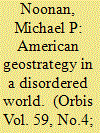

|
|
|
|
|
| Summary/Abstract |
A quarter century after the end of the Cold War the United States faces an international geopolitical landscape that many would have not imagined a generation ago. Today the U.S. faces a disordered world where revisionist powers such as China and Russia wish to change the dynamics of the international system and a revolutionary Islamic State has aspirations to overthrow the entirety of the system itself. While the U.S. still maintains the strongest conventional military capabilities in the system it also has many global commitments and its resources are constrained. In order to cope with the current disordered world it must learn to operate within the current era's ambiguities, particularly in the space between war and peace, and much more adroitly blend its capabilities across the elements of national power to directly and indirectly confront threats and challengers.
|
|
|
|
|
|
|
|
|
|
|
|
|
|
|
|
| 3 |
ID:
143262


|
|
|
|
|
| Summary/Abstract |
As the Foreign Policy Research Institute celebrates its 60th anniversary, we reprint FPRI founder Robert Strausz-Hupe's inaugural essay from Orbis: A Journal of World Affairs. In that year, 1957, most observers believed that that the outcome of the Cold War between the United States and the USSR was uncertain. But the author believed that, based on his understanding of geopolitical realities, that the United States was just then in the process of assuming the leadership of a new universal empire—Novus orbis terrarum, or new world.
|
|
|
|
|
|
|
|
|
|
|
|
|
|
|
|
| 4 |
ID:
143269
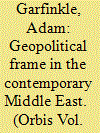

|
|
|
|
|
| Summary/Abstract |
The geopolitical frame is a necessary but insufficient means to understand the contemporary Middle East. Defining the term in its original, fairly narrow, way puts the analytical spotlight on the Westphalian units—namely, states—that compose the classical modern international system. But those states’ lack of decisional agency is itself at the core of the region's instability. As for the region, its troubles are likely to persist for some time. Outsiders cannot fix it; at best, if they are skillful and lucky, they can contain it.
|
|
|
|
|
|
|
|
|
|
|
|
|
|
|
|
| 5 |
ID:
143267
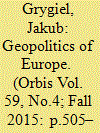

|
|
|
|
|
| Summary/Abstract |
This article contends that “Europe” is a term that describes a geographic reality that aspires to be a political one. Specifically, it highlights the illusions of unity and the delusions of international harmony that permeate Europe's politics today. It concludes by suggesting that the threat that Russia is presenting most immediately in Ukraine but more broadly to Europe as a whole is extremely serious and will alter in some form, hopefully positive, the European continent.
|
|
|
|
|
|
|
|
|
|
|
|
|
|
|
|
| 6 |
ID:
143271


|
|
|
| 7 |
ID:
143263


|
|
|
|
|
| Summary/Abstract |
First published in 1999 in the Naval War College Review, this article is republished unchanged here as an example of how geopolitical reasoning can be used to make predictions about the future. The article first reviews the development and critique of classical geopolitics, defending it as a legitimate approach to understanding international relations, and then uses geopolitics as a lens to predict trends in the world of the twenty-first century.
|
|
|
|
|
|
|
|
|
|
|
|
|
|
|
|
| 8 |
ID:
143265


|
|
|
|
|
| Summary/Abstract |
This article is excerpted from the author's book, The Revenge of Geography, published by Random House in 2012. Kaplan wrote in his preface: “As political upheavals accumulate and the world becomes seemingly more unmanageable, with incessant questions as to how the United States and its allies should respond, geography offers a way to make at least some sense of it all.”
|
|
|
|
|
|
|
|
|
|
|
|
|
|
|
|
| 9 |
ID:
143268


|
|
|
|
|
| Summary/Abstract |
The assertive actions China has taken to press its claims in the East China and South China seas since 2010 indicate that its leadership has decided that the time has come to end Deng Xiaoping's advice to “hide [the country's capabilities] and bide [its time].” Beijing has combined economic incentives and sanctions with small but incrementally meaningful military pressures. Efforts by neighboring states to form a countervailing coalition have thus far proved ineffective. Beijing's tactics have been stunningly successful, though there are financial, structural, and resource weaknesses within China that indicate that the effort to assert control over the area will remain unrealized.
|
|
|
|
|
|
|
|
|
|
|
|
|
|
|
|
| 10 |
ID:
143274


|
|
|
|
|
| Summary/Abstract |
Between 1904 and 1943, the British geographer Sir Halford Mackinder developed and refined his influential geopolitical view of global politics based on an understanding of history in its geographical setting. The roots of Mackinder's worldview reach back to a series of lesser-known writings that foreshadowed key aspects of his geopolitics, including the world as a “closed” political system; the relationship between physical and political geography; the recurring struggle between land powers and sea powers; great powers as “going concerns”; the effect of technology and scientific advances on the political cohesion of continental-sized states; and the impact of population and demographic trends on the global balance of power.
|
|
|
|
|
|
|
|
|
|
|
|
|
|
|
|
| 11 |
ID:
143266
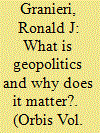

|
|
|
|
|
| Summary/Abstract |
In honor of FPRI's 60th Anniversary, this lecture traces the intellectual roots of FPRI's approach to Geopolitics, as initially formulated by its founder Robert Strausz-Hupé, and considers how this approach contrasts with other intellectual traditions, to help illuminate FPRI's ongoing role in the formulation and discussion of American foreign policy.
|
|
|
|
|
|
|
|
|
|
|
|
|
|
|
|